When customers search for your products online, will they see you or your competitors first? If you aren’t ranking high enough in search results, you may be losing leads that are clicking on the links above yours. To make sure your business is the first one they see, you need to start focusing on Search Engine Marketing (SEM).
SEM is an essential practice for businesses that want to be found as quickly as possible when potential customers search for products and services related to their industry. In this blog, we’ll cover everything you need to know about SEM by showing you what it is, why it’s important, and how to use it to bring more customers to your digital storefront.
Table of contents
An overview of Search Engine Marketing
If you’ve ever looked for a product, service, or business online, you’ve probably used a search engine. Search engines are websites that help you find what you’re looking for on the internet. When you enter specific words into the search bar, the search engine will search the internet for results related to what you searched for and display the top results on the Search Engine Results Pages (SERPs).
Search engine marketing uses paid advertisements and website optimization to get your web pages to rank higher on SERPs. The goal is to rank as high as possible so that more prospects see your results first and are more likely to click on them. With 75% of customers never making it past the first page of SERPs, you need your products to rank in the top results if you want to convert them.
How SEM works
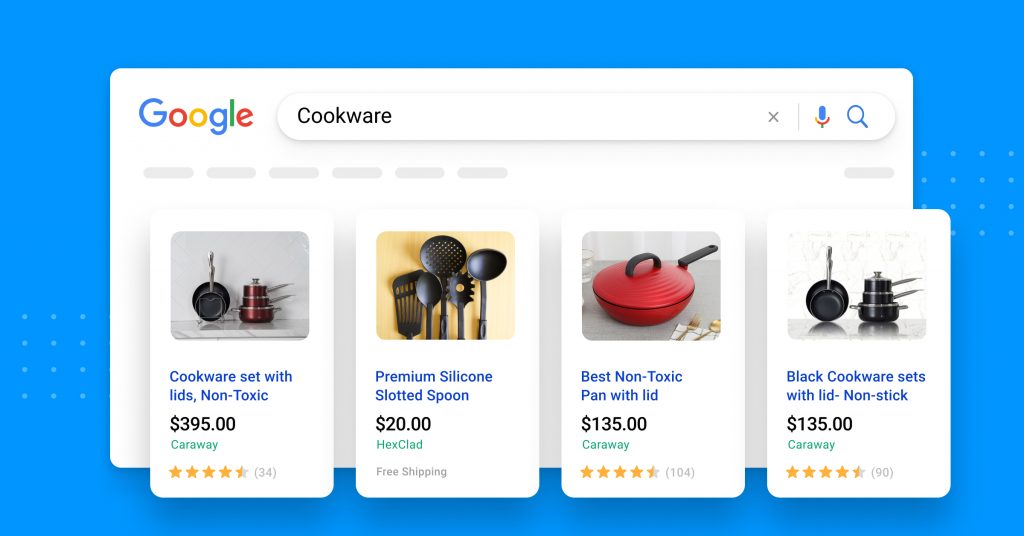
SEM often includes both paid and organic strategies and can be an effective way to quickly drive more traffic to your site. Paid SEM involves buying ads that display your products on SERPs. These ads can be in the form of text, images, or video, and they can appear at the top or bottom of the page.
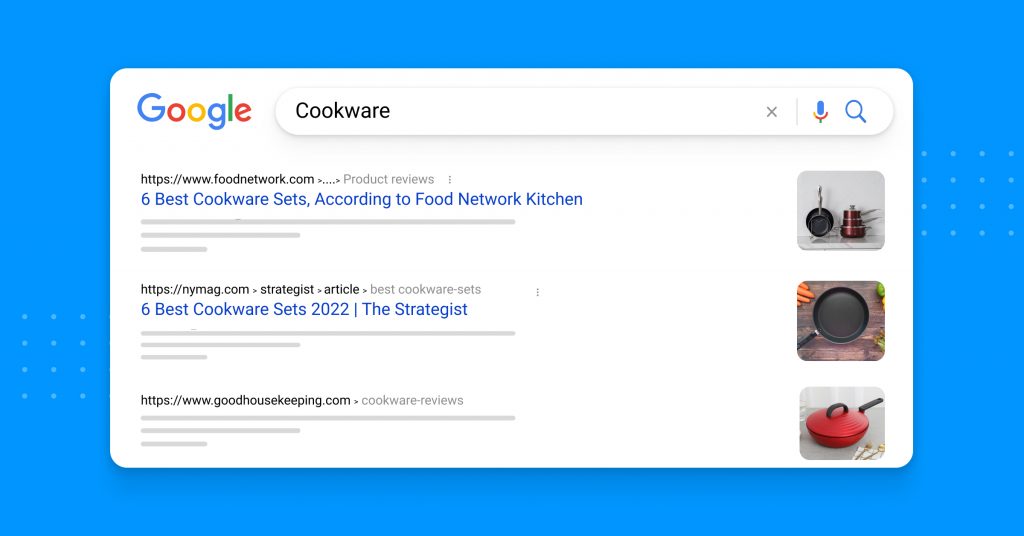
Organic SEM, often referred to as Search Engine Optimization (SEO), involves optimizing your website using keyword research and link building. The goal is to make your content favorable to search engines so they will rank your pages higher in their SERPs.
How to choose the right keywords
Keywords are the key piece of information that search engines use to find the results that are most relevant to the product your customers are searching for. So, if you want customers to find your products first, you need to optimize your product pages with the keywords that search engines look for the most.
Relevance
First, you’ll need to pick keywords connected to your particular industry. For example, if you own a car dealership, you wouldn’t use keywords like “boats for sale” because your customers wouldn’t use those keywords when looking for a car. It seems obvious, but understanding the keywords in your industry can make your ads and content more competitive.
Search volume
Once you’ve found keywords related to your industry, you need to pick the ones with the best overall value. One measurement that SEO tools use to determine the value of a keyword is search volume. The higher the search volume is, the more people are searching for that keyword. So, you should try to pick keywords that have a high search volume and use them in your content so they’re more likely to appear in SERPs. However, search volume is not the only metric that matters when deciding what keyword to use.
Difficulty
The value of a keyword is also measured by difficulty – specifically, how difficult it would be to rank your content for that keyword. For example, the keyword “Google” has a difficulty score of 100%, so it is nearly impossible for your web pages to rank for that keyword – even with a 68 million search volume. So how do you pick the perfect keywords?
Find the right balance
The best idea is to find a perfect balance between search volume and difficulty. A keyword with the right balance has enough search volume that it is worth targeting, and a low-enough difficulty that you still have a good chance of ranking. By picking keywords that are relevant to your industry, and finding this perfect balance, you can improve the chances of ranking your content higher on search engines.
SEM ad auctions
SEM ad auctions are a part of the SEM marketing strategy that lets businesses buy ad space on search engines. This is how you can get your paid advertisement to appear first on SERPs and reach more customers by getting your ads to appear first on SERPS. Let’s take a closer look at ad auctions.
How ad auctions work
Every time a customer searches for something online, the ad auction determines what ads show up, and in what order they appear on SERP. To get your ad to appear at the top of the results, you will compete against other advertisers who want their ad to appear at the top too. To make sure yours appears first, you need to win the auction.
Bidding for clicks
This part of the auction determines how much an advertiser is willing to pay for a click on their ad. So, one advertiser may be willing to pay $3 for a click on their ad, another might bid $5, and another might bid $10. But that doesn’t mean the third advertiser automatically wins the auction. Otherwise, you would see ads totally unrelated to the keyword that was entered into the search engine. There are two other factors that help you win the ad auction: quality score, and ad extensions.
Importance of your quality score
A quality score is a rating that search engines give an ad based on factors like relevance, expected click-through rate (or how often your ad might be clicked on), and landing page quality. A high-quality score means that your ad is relevant to the customer’s search query, is likely to be clicked on, and the page you linked to it gives them a positive user experience.
Expected impact of ad extensions
When you create your ad, you can include additional information like your phone number or links to other areas of your website. These are your ad extensions. The search engine will look at these additional extensions, and determine how positively they will impact your ad’s presence online.
How ads “win” the auction
By placing a high enough bid, getting a high-quality score, and adding impactful ad extensions, your ad has a good chance of winning the ad auction. You need to focus on all three of these factors if you want your ad to appear at the top of the page and show up for more of your potential customers.
Best SEM tools
Researching SEM strategies is one thing, but if you want to reach more customers you’ll need the right tools. Here are some of the best SEM tools you can use to get the job done:
SEMRush
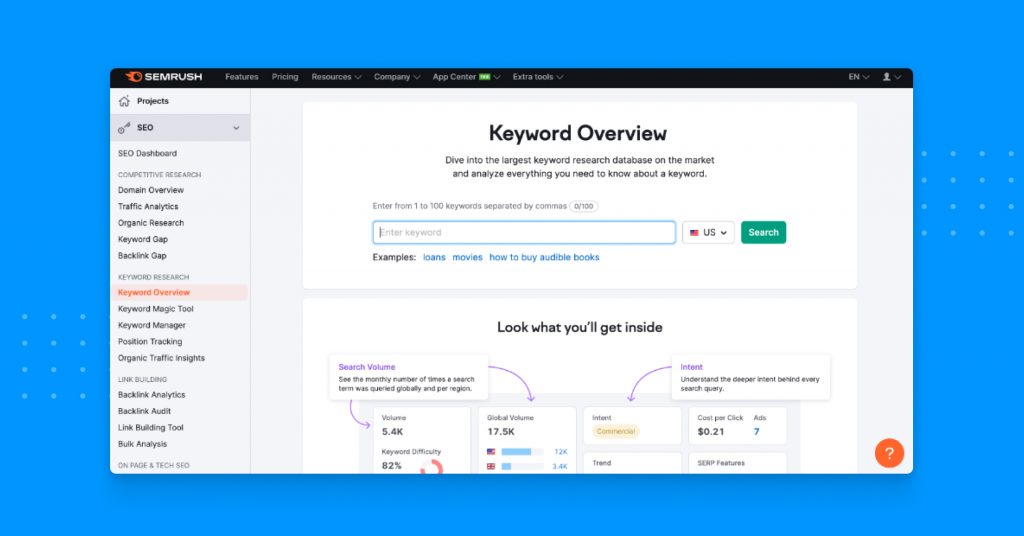
SEMRush is a popular search engine marketing tool that can help track your online performance and improve your website’s visibility in search results. The tool provides data on keyword rankings, search volume, competition levels, and insights into paid and organic traffic.
This information can be used to identify improvement opportunities and track your SEO campaigns’ progress. In addition, SEMRush also offers tools for managing pay-per-click advertising and social media marketing, and tracking your competitors’ search rankings.
Google Trends
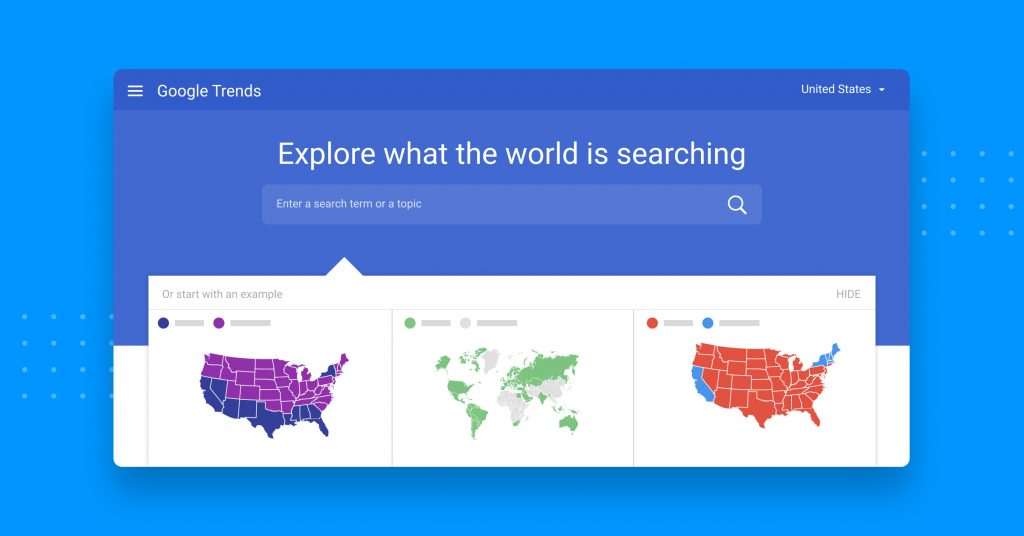
Google Trends allows you to see how often particular terms are searched for on the internet. It’s a useful tool for search engine marketing because it allows you to gauge the popularity of different keywords and phrases over time. It can also help you to identify emerging trends so that you can adjust your marketing strategy accordingly.
Google Trends can also provide insights into which regions of the world are searching for certain terms in your industry more frequently. This information can help identify your target audience in your marketing campaigns and optimize your content to reach them more effectively.
Google Ads Keyword Planner
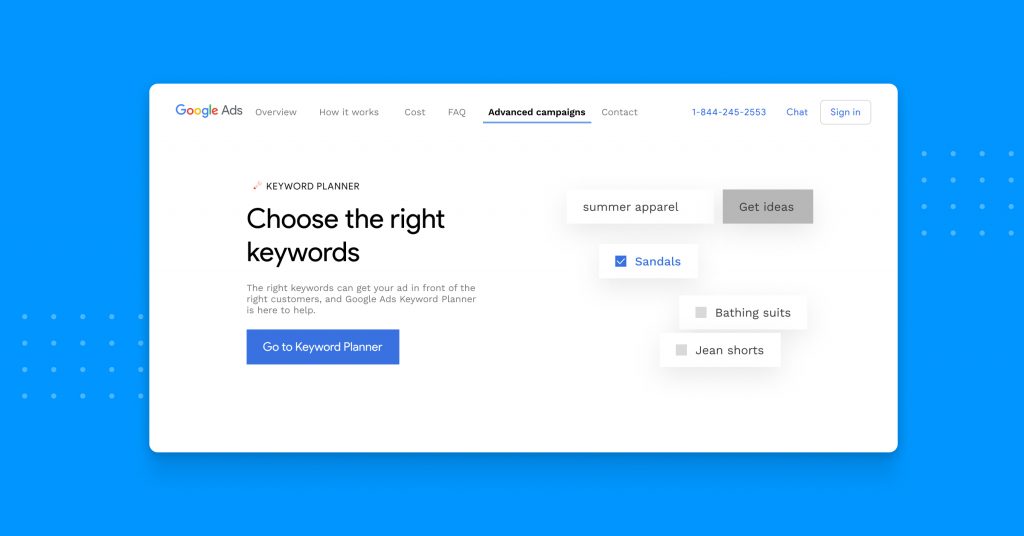
Google Ads Keyword Planner is a free tool that allows you to research and find keywords for your Google Ads campaigns, and helps you understand how people are searching for your products or services online.
By understanding what keywords are being searched most frequently, you can target your ad campaigns more effectively and improve your chances of driving traffic to your website. The Keyword Planner can also help you to estimate how much traffic a particular keyword may generate, which can help set your budget for a campaign.
Frequently asked questions about Search Engine Marketing
No. SEM stands for Search Engine Marketing which covers a variety of marketing strategies to rank higher in search engines. In contrast, PPC stands for “pay per click,” a single type of online advertising.
SERP stands for Search Engine Results Page. It’s the page that appears after entering a keyword or search term in a search engine like Google or Bing. When optimizing your content, you want to rank as high on the SERP as possible to reach more customers.
Market your business effectively with Birdeye
No matter your industry, effectively marketing your local business is critical to attracting more customers and standing apart from your competition.
With Birdeye, you can effortlessly build your reputation, stand out online, and continually attract more customers to your business. Download our free guide below to learn about all the ways Birdeye can help you grow.

Originally published









